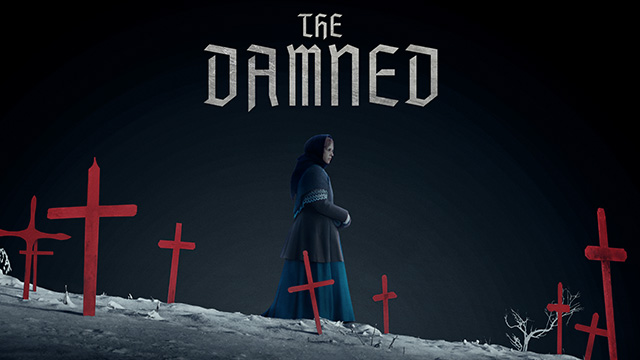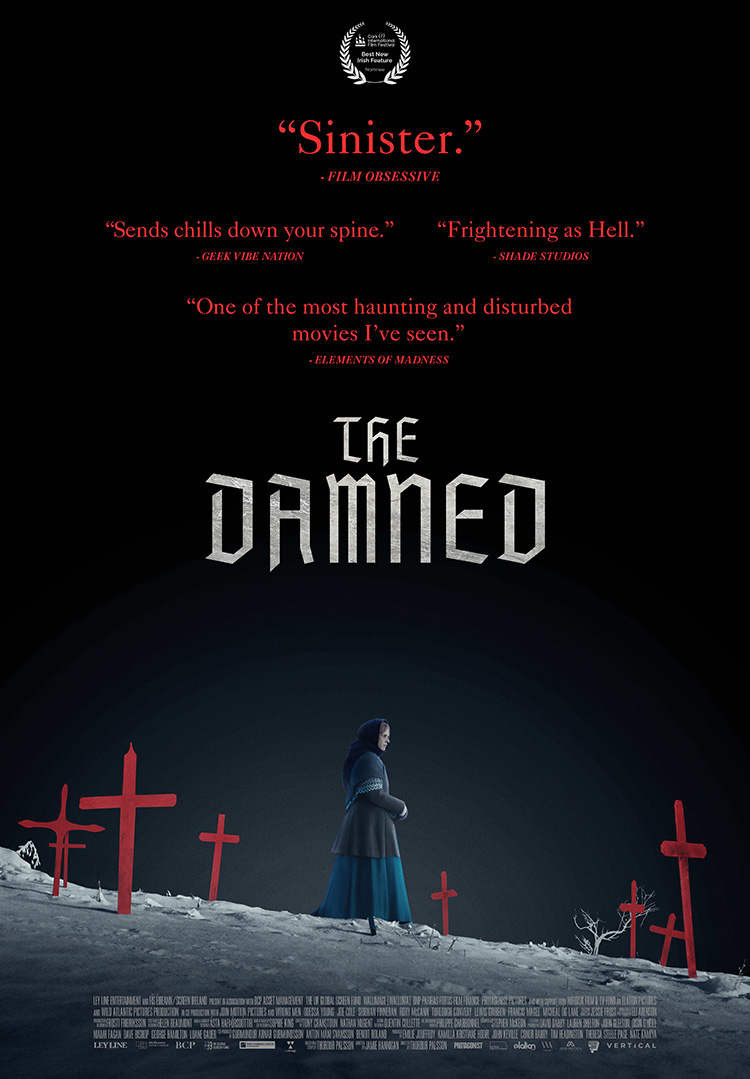

Monday February 3, 2025 | Movie Reviews | Neal
The Damned
A review by Aaron Barrocas
Minor Spoilers.
We should not be here.
Magnus said it was a place of opportunity
if we could endure the cold, the long nights, the hunger.
This time last year all these racks were full.
Yesterday we started eating the fish we had set aside for bait.
The men don’t want to think of anything except the next day at sea.
Perhaps that’s the only way they can survive.
-Eva
The Damned

Classic literature and popular culture have always taught us to respect the power of the sea - The Odyssey, Moby Dick, The Old Man and the Sea, The Rime of the Ancient Mariner, Jaws, The Perfect Storm.
There’s a world of cultural context to any story about fishermen. Rugged strength from a high-risk, high-reward occupation where human life can be cheaper than pounds of Atlantic cod. Drunken camaraderie and loneliness. Constant and ignored danger.
We enter this film comfortably with that level of world-building already established for us by our previous literature and film consumption, and in the case of some viewers, by life experience. This tumultuous world is our jumping-off point.
The Damned, a story of cursed fishermen and their recently widowed employer Eva (Odessa Young), set on a remote fishing village in 1871, starts with an uncomfortable dinner. A supernatural fisherman morality tale is told with gravitas to the rapt audience of tired, vulnerable fishermen by Helga (Siobhan Finneran), one of two women in the small fishing post. If the story itself were two hours in that dining space, lit by flames in a landscape otherwise so cold that viewers can almost appreciate the heat of the food, we would listen for two hours. This is how the movie is to be. It will never rush, and it will never bore. It isn’t a slow burn, but it is very deliberately paced. A story told with enough restraint to bring the moments to life and let us feel the characters’ fear - which in this case is the heart of the movie.
The story then seamlessly moves from Helga’s supernatural morality tale to its own wider-reaching supernatural morality tale, told in a similarly engaging style to us - as rapt an audience as Helga’s fishermen, despite never stepping foot on a 19th century fishing boat.
In all fiction, as in life, characters are the choices they make. Odessa Young’s Eva chooses to keep her crew on a remote fishing island despite deadly conditions. She decides not to risk her mens’ safety when another crew’s ship is stranded and sinking, and in need of help - amongst the same treacherous rocks that killed her husband one year prior. She decides that the remaining provisions and maybe even the fish that had been caught by this doomed fishing ship are worth exploring by rowboat - as her own men are facing death by starvation. Upon learning that the stranded fishermen are alive and need help, she doesn’t discourage the panicked decision to murder the desperate survivors rather than stretch their own meager resources.
The human condition is painful and ironic. We see people make cruel choices for all the wrong reasons, and we almost expect that those choices will come back to haunt them as a lesson to themselves and to others. Indignation is a pleasure we too often allow ourselves, as somehow it seems justifiable when there is a clear villain. Yet haven’t we all made choices we regret? Do we ourselves worry that those choices may return to us? Let he who is without sin…
And so, having committed murder, the superstitious fishermen begin to fear a Draugr. A Draugr is a living corpse - reanimated, bloodthirsty, and seeking vengeance. The corpses of the murdered shipwreck victims are strapped down and locked in caskets. Bad omens abound. The fearful now have much to fear.
Director and Co-Writer Thordur Palsson did not carve out an easy project out for himself. The script that he and Jamie Hannigan wrote is a dark, haunting, psychological horror period piece where all elements need to fall into place properly for the story to work from beginning to end.
A particularly strong choice that contributes to the film’s effectiveness is the casting. The movie stars experienced film and tv actors with recognizable, worn faces. They look and feel like they belong in this place.
Odessa Young is entirely convincing as a suffering widow who has inherited the responsibility of keeping her crew alive, and is willing to make cruel decisions towards that end - only to find herself torn with guilt and fear as a result. Daniel (Joe Cole), as the most respected and trusted of the fishermen, bears the emotional weight of the decisions made, and wrestles through a tremendous emotional turmoil as his crew falls apart under the strain of the fear of unearthly retaliation. Ragnar (Rory McCann) seems to have seen more days than his years would suggest. An intimidating leader with a formidable tone, McCann clashes powerfully on screen with Odessa Young’s quietly strong Eva. Siobhan Finneran’s Helga seems as if she has fed and somewhat befriended generations of fishermen on this tiny post, and speaks from a place of experience, wisdom, and deep belief in things beyond our realm. The combined result of these impressive performances is a sense that we understand these dynamics and experience the events of the film as involved participants, rather than outsiders watching unfamiliar people in unrelatable situations, which is occasionally a pitfall of both period pieces, and films with intentionally deliberate pacing.
Helen Beaumont’s period wardrobe and Sophie King’s weathered makeup heavily enhance this effect. The men and women look gaunt, hungry, weakened by the elements - prepared to be destroyed by the worst parts of themselves.
The sound design department deserves much praise, as the atmosphere is constantly present. The boats, the land, the quarters - each are their own unique worlds, created by a combination of atmosphere and some incredible foley. When you watch this movie, don’t cheapen your experience by skimping on your audio. Whatever speakers you have, turn them up - it’s worth it.
Director of Photography’s Eli Arenson’s frequent use of candlelit interiors, along with the brightest of sunny, snowy days, and the darkest nights at sea are regularly both beautiful and dramatically striking. Arenson and Palsson’s slow, well-considered shots that often follow the larger story rather than whoever is speaking serve to bring us further into Eva’s constant crisis of conscience.
And of course, none of this would work without a gripping screenplay painstakingly written in the style of an older ghost story, where the threats are in the shadows, and the reveals are slow but impactful. Characters are developed and often put to deep tests.
Overall, The Damned is a disturbing ghost story, and human story, that should be watched in a dark room with loud speakers and your phone firmly out of reach. If you step into Pallson’s frightening, cold world, you’ll remember your time there. Every person on this cast and crew seems to have shared their experience and talent to its fullest, and I look forward to seeing what they all do next.
I give this movie, and the brilliant team who made it, today’s full catch of 5 out of 5 shipwreck survivors.
The Damned is currently playing in select movie theaters.
Aaron Barrocas is an award-winning screenwriter, filmmaker, and editor living in Los Angeles. He has spent the past 25 years as an active part of the entertainment industry.
AaronBarrocas.com